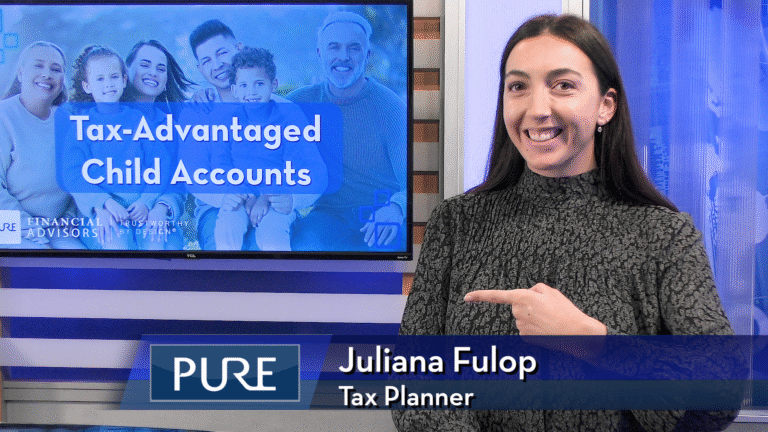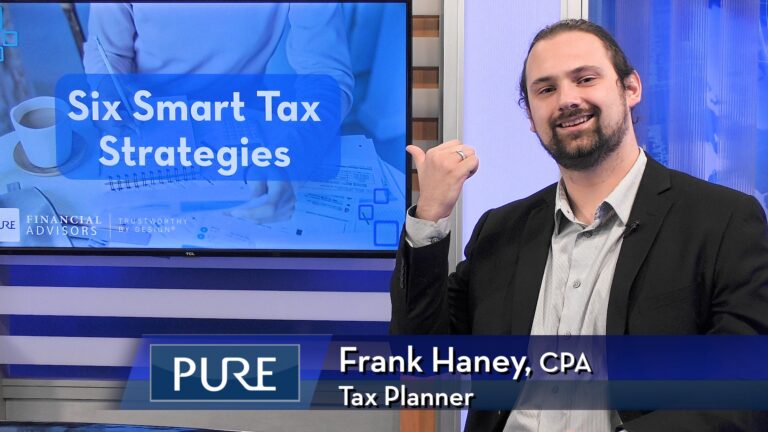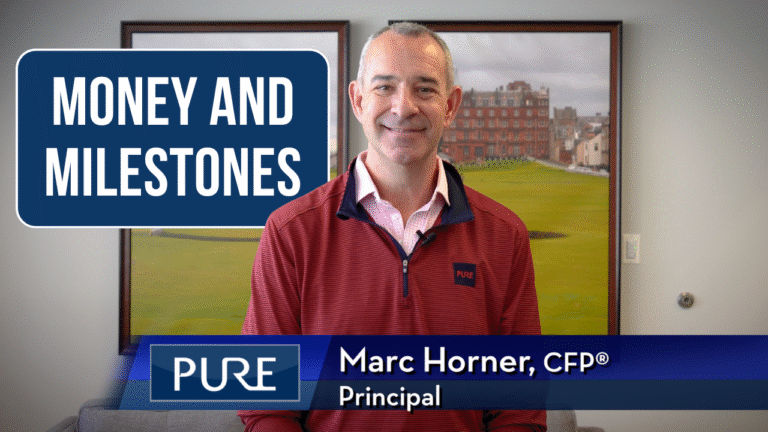Feeling anxious or concerned about the upcoming presidential election is completely normal. Pure’s Financial Advisor, Sumit Mehta, CFP®, AIF® offers strategies to help manage our emotions, ensuring they don’t take control of our decision-making during this period.
Important steps include:
- Focusing on what you can control
- Aligning your spending with your values
- Maintaining historical perspective
FREE GUIDE | Investing Basics Guide
Transcript
Are you feeling any anxiety heading into this election cycle? Is there a candidate you absolutely want to win? Have you thought about how this is affecting your life and your financial decisions? A recent survey found that 57% of investors feel anxious or scared about presidential election outcomes. Now, fear can lead to poor investment decisions as we seek safety by moving out of the markets to hoard cash.
The stronger our political opinions, the more we need to manage our emotions so they don’t end up managing us. Successful investors feel these same emotions; they just have systems in place for dealing with them.
Election years can provoke anxiety because the unknown tests our tolerance for ambiguity, and because adapting to change can be challenging.
If you are feeling at all affected by the upcoming election, there are three practical steps you can take for yourself:
- Focus on what you can control
- Align your spending with your values
- Maintain historical perspective.
Let’s start with the first, focus on what you can control: You can control your vote, your lifestyle and your daily choices. You cannot control interest rates, inflation or the stock market. By the way, no single person, including the next president, can control any of these. Focusing on what you can control will help keep you grounded and also help reduce the worrying that often arises when we think too much about things outside our control.
Now let’s look at the second step, aligning your spending with your values: While it is always easy to spend money on things you don’t need, it is even easier to spend more during stressful times to feel better – this is called retail therapy, and the effects are both financially detrimental as well as emotionally short-lived. So, what can you do? Think about what you really need to feel comfortable and stable and ensure that your spending aligns with that end goal. Controlling frivolous expenses can help bring back a sense of control and stability to your life. While this is helpful at all times, it is especially important during times of elevated stress.
Finally, keeping a historical perspective: Can the ruling party really influence your investment returns? Has that been the case in previous election cycles? The short answer is no. When we look at data, with a one-year lag time to let policies affect financial markets, the S&P 500 has achieved a compound annual growth rate of 9.3% during Democratic presidencies and 10.2% during Republican presidencies. Now while that’s quite close, more telling is the following statistic. $10,000 invested in the S&P 500 since 1950 would be worth $3.28 million today. If that same amount was moved to cash during election years, it would be worth only $980,000. The conclusion is clear: Far more profitable than to be concerned with who is in the White House is to stay invested across all presidential cycles.
To recap, if you are feeling anxious or concerned about this upcoming presidential election – that is quite normal and common. Some important steps: focus on what you can control, align your spending with your values, and maintain a historical perspective on investment impact. Remember, staying invested is far more profitable over time than moving to cash.
Would you like to see if you’re on course to reach your retirement goals? Take advantage of our free financial assessment and find out today.
Subscribe to our YouTube channel.
IMPORTANT DISCLOSURES:
• Investment Advisory and Financial Planning Services are offered through Pure Financial Advisors, LLC, a Registered Investment Advisor.
• Pure Financial Advisors LLC does not offer tax or legal advice. Consult with your tax advisor or attorney regarding specific situations.
• Opinions expressed are subject to change without notice and are not intended as investment advice or to predict future performance.
• Investing involves risk including the potential loss of principal. No investment strategy can guarantee a profit or protect against loss in periods of declining values.
• All information is believed to be from reliable sources; however, we make no representation as to its completeness or accuracy.
• Intended for educational purposes only and are not intended as individualized advice or a guarantee that you will achieve a desired result. Before implementing any strategies discussed you should consult your tax and financial advisors.
CFP® – The CERTIFIED FINANCIAL PLANNER™ certification is by the Certified Financial Planner Board of Standards, Inc. To attain the right to use the CFP® designation, an individual must satisfactorily fulfill education, experience and ethics requirements as well as pass a comprehensive exam. Thirty hours of continuing education is required every two years to maintain the designation.
AIF® – Accredited Investment Fiduciary designation is administered by the Center for Fiduciary Studies fi360. To receive the AIF Designation, an individual must meet prerequisite criteria, complete a training program, and pass a comprehensive examination. Six hours of continuing education is required annually to maintain the designation.












